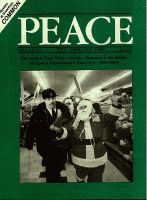
Peace Magazine Dec 1989-Jan 1990, page 9. Some rights reserved.
Search for other articles by David Webster here
For East Timor, October represented a glimmer of hope in a decade and a half of almost unrelieved misery. At least forty people were arrested and tortured, but a Papal visit brought comfort to the Catholic Timorese and - even more important - signs of growing international support for the forgotten people of a neglected land.
The war against the mountain people of East Timor has been going on since thousands of Indonesian armed forces "volunteers" invaded the tiny former Portuguese colony on December 7, 1975. Since then, a hidden holocaust has engulfed East Timor. In fourteen years of Indonesian military occupation, 250,000 out of a population of 680,000 have died, a result of war, bombing of villages, illness and deliberately-induced famine. More recently, compulsory abortions and rumored murder of newborns by the injection of poisonous drugs have added genocide against future generations to genocide against the living. Yet, at a time when peace seems to be breaking out around the world and self-determination is increasingly recognized as the right of all peoples - Afghans, Estonians, Falklanders, Sahrawis of the Western Sahara - East Timor is ignored.
Now, all this may be beginning to change. A recent historic conference - the first of its kind in Canada - was held October 19-20 at Ottawa's Carleton University. It brought together activists, academics, students and politicians from Portugal to Japan. If the movement to support Timor that came out of the conference can be sustained, the support of Western governments which sustain Indonesia may yet be ended; East Timor may yet be allowed to decide its own future.
The first day of the conference saw 150 people listen to speeches by long-time supporters of the Timorese cause: Derek Evans of the Canada Asia Working Group, Sorbonne professor of international law Michel Robert, Michio Takahashi of the Free East Timor! Japan Coalition, Elaine Brière of Canada's East Timor Alert Network, retired Australian diplomat James Dunn, and José Ramos-Horta, representative of the Timorese independence movement Fretilin at the United Nations and former foreign minister of East Timor.
After hearing their testimony, few could disagree with the conclusions of five Portuguese Parliamentarians in attendance: "An escalation of human rights violations in East Timor has been verified, namely the continuation of massacres - the arbitrary political arrests of hundreds of Timorese - ongoing forced mass sterilization, the compulsory displacement of entire populations and the adoption of intolerable birth control methods, financed by the World Bank, and the colonization of the territory with alien populations subservient to Jakarta - practices condemned by the United Nations and qualified as crimes of genocide."
An evening reception on Parliament Hill - home of successive governments who have backed Indonesia's ruling generals - heard from American international law expert Richard Falk, one of the Portuguese M.P.s, and a representative of Parliamentarians for East Timor from each of the three parties: Conservative David Kilgour, Liberal Christine Stewart, and Lynn Hunter of the NDP. But despite Parliamentarians for East Timor, none of the parties has any position on East Timor, and Liberal and Conservative governments have denied that human rights violations are taking place.
Day Two of the conference was a strategy session attended by about forty people. Proposals that came out of this session included:
Setting up a Timorese school and cultural centre with education in Tétum (the major language of East Timor) in Darwin Australia, to help preserve a culture threatened with extinction.
An international petition campaign aimed at the United Nations and the International Court of Justice.
A student campaign to free the 40 protestors (mostly students) arrested and tortured after a demonstration at the Oct. 12 Papal Mass in East Timor.
Support for the Catholic Church of East Timor, the only space for dissent and sole means of self-expression left to the Timorese by the Indonesians.
Working to get East Timor recognized as an issue by human rights, peace and Third World support groups.
Demonstrations at Indonesian and Canadian government offices on December 7, the fourteenth anniversary of the invasion.
After the Ottawa conference, a hastily-organized speaking tour went to Peterborough, Toronto, Waterloo and Montréal. Audiences of about 50 in each city heard from James Dunn, José Guterres (a 27-year old refugee who was tortured because of his involvement with the resistance) and Canadian film-maker and activist Peter Monet.
Information on the history and current situation in East Timor, and the efforts being made to end Canada's support for the genocide, is available

Peace Magazine Dec 1989-Jan 1990, page 9. Some rights reserved.
Search for other articles by David Webster here